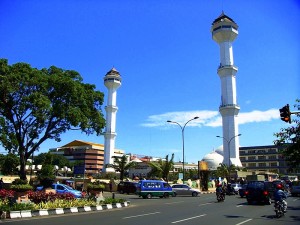 Indonesia’s economy will expand 5.3% in 2016, but the outlook comes with risks, according to a new report from the World Bank.
Indonesia’s economy will expand 5.3% in 2016, but the outlook comes with risks, according to a new report from the World Bank.
Chief economist of the World Bank for Indonesia Ndiame Diop said on October 22 that risks include the US central bank raising interest rates, an economic slowdown in major trading partners such as China, and the private sector remaining weak on the falling value of rupiah.
“There is also risk of bad impact of the weather phenomenon El Nino,” he added, adding that the consequence could be a surge of up to 10% in rice prices in 2015.
GDP growth remained at 4.7% for the second quarter of 2015, due to weakening global trade and lower commodity prices, as well as moderating fixed investment and domestic consumption, according to the October 2015 edition of the Indonesia Economic Quarterly (IEQ), entitled “In Times of Global Volatility.”
“Indonesia faces challenges ahead along with its neighbors, as China rebalances its economy and the US Fed prepares to normalize monetary policy. But growth performance here remains better than other commodity exporters, and the government’s policy responses are pro-active. Effective implementation of these reforms will provide a much-needed boost to investor confidence,” said Rodrigo Chaves, World Bank country director for Indonesia.
The Indonesian government’s efforts, including granting stimuli, reforming policies, and improving the quality of its state spending have helped the country overcome the global volatility which has hampered economic growth, said the report.
“Efforts to support businesses and people, as well as regulatory reforms that reduce red tape for investment and exports, are strong initiatives. Additional reforms will enhance the investment climate and accelerate growth. Further focus on the manufacturing sector and on tourism—both insufficiently tapped opportunities—would help boost incomes and prevent the current account deficit from rising again when growth strengthens,” said Ndiame.
“Of course, the efforts can also help Indonesia reduce (its burden) in the following years,” Chaves said. “The implementation of the government’s policy is a good step in the reform efforts, thereby strengthening investors confidence.”
Meanwhile, Ndiame said various policies taken by the Indonesian government amid global economic uncertainty have propped up budget absorption in the third quarter to 21.4% in the real condition during the first nine months of 2015 compared to the same period last year.
Widodo to launch fifth package and more
As this developed, President Joko Widodo said the economy has in fact improved in the third quarter and that he would present before the end of this week the administration’s fifth stimulus package.
“In this quarter—and I have just now met with the governor of Bank Indonesia—the growth rate has reached 4.85. The slowdown has stopped and the economy is moving up,” he said in a report by Antara News released October 21.
He said the fifth package of economic policies will be followed later by other packages featuring short and medium-term policies aimed at making the country more competitive.
The President said Indonesia must be able to compete with other countries, such as Vietnam and India that have undergone fast economic growth, adding if Indonesia fails to carry out reforms, investors will bypass it.
“The IHSG (stock index) has already started to rebound while development will no longer remain centered in Java. Instead, development will happen all across Indonesia, especially eastern Indonesian regions,” he said.
Photo: Prayudi Setiadharma





